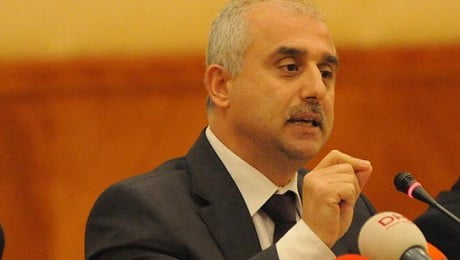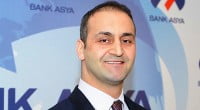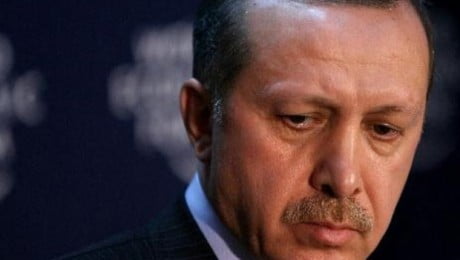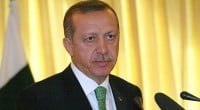Keyword: Hizmet (Gulen) movement

Hizmet movement sticks to principles, AK Party transformed by the state
Holding ia press conference in light of the recent row between the government and the Hizmet movement on Wednesday, Journalists and Writers Foundation (GYV) President Mustafa Yeşil asdi the Hizmet movement has not changed its principles in the last half century but the Justice and Development Party (AK Party) has been transformed by the state and lost its reformist nature.

Bank Asya says it weathers ‘stress test’, still strong
Turkish media say state-owned companies and institutional depositors loyal to Prime Minister Recep Tayyip Erdoğan have withdrawn TL 4 billion ($1.79 billion), some 20 percent of the bank’s total deposits, over the last month to try to sink the lender. The government has declined to comment. Bank Asya’s chief executive Ahmet Beyaz said the bank’s founders included sympathizers of cleric Fethullah Gülen, who officials say is behind the corruption investigation posing one of the biggest challenges to Erdoğan’s 11-year rule. But he said the bank was not at risk.

Nearly 500 police officials reassigned in Ankara, İzmir
Erdoğan has reacted furiously to the corruption investigation, decrying an attempted “judicial coup” his supporters see as orchestrated by the Hizmet movement. He has reassigned thousands of police officers, more than a hundred judges and prosecutors, and purged official bodies of executives he suspects of being close to Turkish Islamic scholar Fethullah Gülen.

Turkish people upset that democratic progress is being reversed: Islamic scholar Gülen
The Turkish people are upset that democratic progress has gone into reverse over the last two years, Islamic scholar Fethullah Gülen has said, speaking in his first interview since the graft probes that have damaged the government and widened the rift between his movement and the ruling Justice and Development Party (AKP).

Gülen underlines values, rejects alliance with political party or leader
In response to a question on whether “the alliance” between the Justice and Development Party (AK Party) and the Hizmet movement had ended, Gülen said, “If we can talk about an alliance, it was around [the] shared values of democracy, universal human rights and freedoms — never for political parties or candidates.”

MEP: International investigation into Turkey’s rule of law needed
Schaake stated: “The separation of powers is under immense pressure in Turkey and the rule of law is not upheld. This crisis also impacts the relations between the European Union and Turkey, because measures taken, such as political intervention with the judicial branch, are not in line with European rules. The independence of the judiciary has been a concern for Europe for much longer.

Shocking change and disappointed hearts…
Since Dec. 17, Erdoğan’s discourse has become more and more strict and a major smear campaign has been initiated by the pro-government media against the Hizmet movement, which has been active in education activities all around the world. The Hizmet movement and the followers of Hizmet have never been affiliated with violence or any other crime-related issues. This was proven as a result of a judicial process.

22 businessmen sue PM Erdoğan over Hashishin remarks against Hizmet
Dr. Mahir Şahin, one of the plaintiffs, made a statement in front of the courthouse and argued that the people who follow the Hizmet movement, known as the “Cemaat” (community), are openly being targeted by publicly associating them with the corruption probe that broke out on Dec. 17.

Erdoğan gov’t abusing regulatory agencies to punish opponents
Pressuring state regulators to abuse their powers, the ruling Justice and Development Party (AK Party) government has mounted an aggressive campaign to punish groups and companies that are critical of the government’s handling of a massive corruption investigation, which has led to questions about the credibility and independence of regulatory agencies in Turkey.

Journalist and Writers Foundation welcomes EP’s transparency calls to Hizmet movement
Most recently, on Dec. 30, 2013, the Journalists and Writers Foundation (GYV), whose honorary president is Mr. Fethullah Gülen, issued a press release calling on those making allegations about the Hizmet movement to provide evidence to prove their claims without delay.

This is too much! [About the Lies and Slanders directed to Gulen movement]
Prime minister said during the fourth ordinary general meeting of the Turkish Confederation of Businessmen and Industrialists (TUSKON) in March of 2012:
“You are not backed by dark forces. You are not backed by the mafia, gangs, junta regimes. You are not backed by the bankers in Galata. You did not take advantage of the sources of the Treasury or public banks. You did not act according to an ideology. You did not surrender to the pressures and roadblocks. You only trusted in the people. Because you only relied on people, you are great and make this country great.”

You cannot fool all the people all the time
In a panic to save its future, the Erdoğan government calling it a “parallel state,” an “illegal organization,” a “criminal gang,” a “web of treason” and “raving Hashashins” is attempting to collectively punish the Hizmet movement, whose establishments have significantly contributed to the betterment of the country in the fields of education, business, democratization, social solidarity and international relations.




















